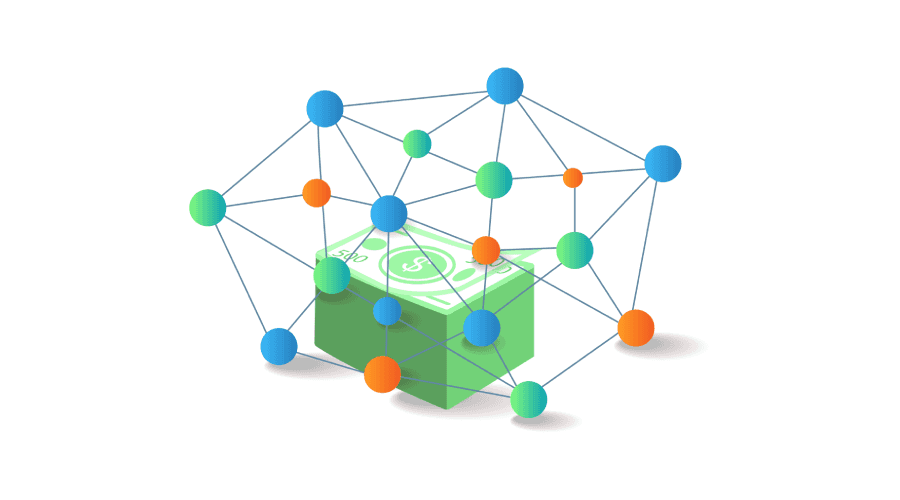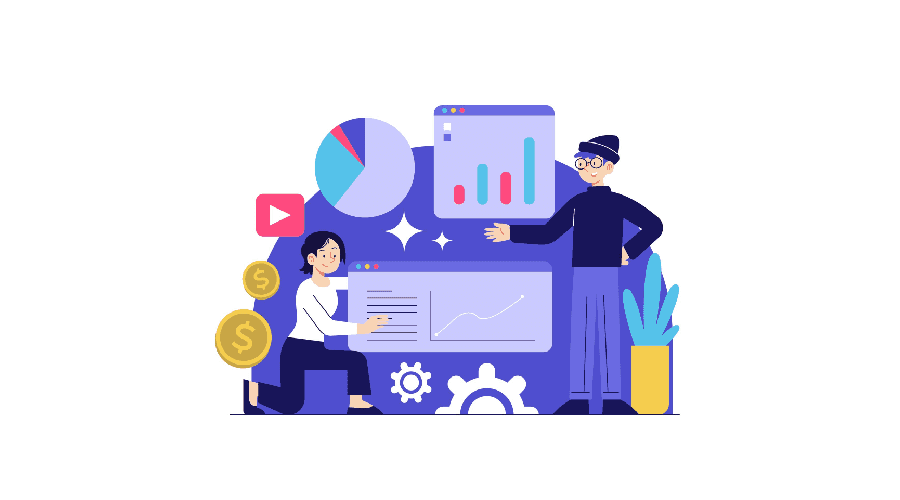To estimate the cost of building a website or an app, use our app cost calculator tool.
With the advent of emerging technologies, C-level leaders have to keep their feet ready to venture into new camps. Exciting, isn’t it?
With the global pandemic, the growth of DeFi took the financial landscape by storm. It’s not surprising that the growth is unprecedented, with the Total Value Locked (TVL) spiking and touching a recent $86 billion.
Thus, tech leaders need to embrace the decentralized finance (DeFi) technology marvel—its applications and platforms to pave the way for more innovative crypto and digital spaces.
Here are some critical insights that can help understand what DeFi is and how it can impact the financial ecosystem.
What is Decentralized Finance (DeFi)?
Decentralized finance (DeFi) is more than a trending buzzword in the FinTech landscape. It offers a shift from traditional operatives where centralized systems manage most banking, trading, and lending to democratize finance.
DeFi replaces legacy, centralized institutions with peer-to-peer relationships. It is like self-custody finance – so no one can access your money except you.
It can offer a full spectrum of financial services, ranging from loans, banking, and mortgages, to complicated contractual relationships and asset trading.
What’s more?
DeFi’s growth trajectory has been nothing short of phenomenal.
Here are some exciting insights.
- DeFi helped grow the market of locked-up assets from less than USD1 billion in 2019 to over USD100 billion in just two years. Plus, it helped attract at least one million global investors in the process. (Source)
- The DeFi market is expected to grow to a staggering USD800 billion in 2022, with more institutional investors entering the DeFi industry. (Source)
Now, that’s exciting! Plus, here are some key focus points.
- DeFi draws inspiration from blockchain, meaning it isn’t controlled by a single, central source.
- It eliminates the fees typically charged by banks and other financial companies for using their services.
- It has several passionate evangelists who promote its potential for innovation, transparency, and financial inclusion.
- It takes advantage of diverse technologies developed in the blockchain sphere.
- It enjoys the benefits of efficiency, and you can transfer funds in seconds and minutes.
- One needs to have an internet connection to use it (without needing approval.)
How Does DeFi Work?

Let’s take a moment to reflect on how traditional finance works. Typically, financial institutions act as guarantors of transactions. So, your money flows through such institutions, giving them immense power. One of the bottlenecks experienced is a highly regulated market. Plus, there’s often a need for the frequent amount of fees to be paid.
Enter DeFi (previously known as "open finance.") The shift to the new model—DeFi takes the middleman (and such financial institutions) out of the picture in financial transactions. N
ow, one can enjoy ownership of digital currency and use it directly. Thus, eliminating the bank or credit card issuer as the intermediary between you and a merchant when you make a purchase.
Thus, DeFi transforms the industry through both the essence (what) and conduct (how). That is, the DeFi landscape creates a new infrastructure where it can deliver similar financial products and services.
Simply, decentralized finance is primarily based on Ethereum and is all about code. It uses smart contracts and cryptos to offer services that do not require intermediaries. So, a smart contract replaces the financial institution in the transaction. Here, a smart contract is a type of Ethereum account—an account that can hold your funds.
Plus, it can send (or refund) them based on certain conditions. What’s the advantage? The smart contract will always run as programmed. Yet another benefit is that no one can alter that smart contract when it’s live. Moreover, contracts are public, so anyone can inspect and audit them. The facet means that bad contracts can come under community scrutiny pretty quickly.
The essence of DeFi is wonderfully captured by David Malka, CEO, and Founder of YieldFarming.com, and he reiterates that DeFi allows for smart contracts on the blockchain to replace trusted intermediaries, including banks or brokerage firms, for all peer-to-peer transactions.
He also adds that it helps investors earn income from cryptocurrency. And such peer-to-peer transactions in DeFi can include everything from payments, investments, lending, and more.
Key Benefits of Decentralized Finance
DeFi has some compelling benefits. Let’s look at some of them.
- Permissionless and Inclusive. Unlike traditional finance, DeFi is permissionless and inclusive. Thus, anyone with an internet connection and crypto wallet can access the DeFi services, regardless of their geography. And often, there’s no specific requirement of a minimum amount of funds. What’s more? Users no longer need to wait for bank transfers or pay bank fees. So, users can swiftly make trades and move their assets wherever they want.
- Transparency. Every transaction that happens on the public Ethereum blockchain gets broadcast to and verified by others on the network. The facet encourages high-level transparency around transaction data and facilitates rich data analysis. Plus, it ensures that network activity is available for any user. Moreover, Ethereum and the DeFi protocols that run on it are built with open-source code, making it available for anyone to view, audit, and build upon.
- Self-Custody. DeFi users can enjoy custody of their assets using non-custodial crypto wallets (like MetaMask, MyEtherWallet, Coinomi, and Exodus, among others) or via smart contract-based escrow.
- Programmability. Smart contracts are highly programmable and have the potential to be designed to execute automatically based on an infinite number of variables. The programmability enables the creation of new financial instruments and digital assets.
- Immutability. The data coordination across a blockchain’s decentralized architecture is tamper-proof, which increases both security and auditability.
- Interoperability. When it comes to the composable software stack of Ethereum, it ensures that DeFi protocols and applications are built to both complement and integrate one another. The advantage of DeFi is that developers and product teams enjoy the flexibility to work on the development on top of existing protocols, integrate third-party applications, and customize interfaces.
- Real-time Transactions. With DeFi, transactions happen in real-time. So, the moment a transaction is completed, the underlying blockchain is updated immediately. Plus, the interest rates are updated multiple times every minute.
Top 6 DeFi Use Cases
DeFi outperforms legacy systems both in terms of efficiency and security. It’s no wonder that there are several impactful DeFi use cases. Here are some of them.
1. Asset Management

Isn’t it a wonderful feeling to have control over your assets? Yes, you’re right! And that’s one of the most compelling impacts of DeFi, where users can enjoy more control of their own assets.
Several top DeFi projects offer solutions allowing users to manage their assets, including transferring, buying, and selling digital assets. What’s more? Users can also look forward to earning interest from their digital assets.
One concern can be regarding privacy. However, DeFi helps users to enjoy the privacy of their sensitive data. How? With encryption, several DeFi projects, such as Argent, Metamask, or Gnosis Safe, help users to encrypt and store those pieces of information on their personal devices. Thus, asset management is a practical decentralized finance use case offered to the users.
2. Decentralized Autonomous Organization (DAO)
Think about the decentralized autonomous organization (DAO) as an entity that has no central leadership. In DeFi, think of them as counterparts to centralized financial institutions.
Well, one can simply look at them as internet-based businesses owned collectively. And the enterprises get managed by its members. DAOs have built-in treasuries, and no one has the authority to access them without the approval of the group.
As the name suggests, they are decentralized by nature and do not follow the boundaries set by central governments or agencies. Plus, the good part is that everything is out in the open. And the rules around spending are embedded into the DAO via its code.
Simply, the backbone of a DAO is its smart contract. The contract holds the organization's rules and the group’s treasury. Can anyone change the rules? Well, the one-word answer is ‘no.’ So when the contract is live on Ethereum, no one can change the rules except by a vote.
Moreover, DAOs don’t need a central authority, unlike their counterparts. Instead, the group collectively makes all decisions, whereas payments get automatically authorized via the passing of votes.
3. Compliance and KYT

In traditional banking systems, the know-your-customer (KYC) protocols are highly-emphasized. The KYC rules are the most critical compliance instrument for implementing anti-money laundering (AML) and counter-terrorist financing (CFT) measures. However, when looked at in the light of DeFi, they conflict with the privacy efforts.
So, how does DeFi address this issue? It uses the know-your-transaction (KYT) model.
The model is a solution that avoids focusing on users’ identities and instead implies that the decentralized infrastructure would be more concerned with transaction behaviors and digital addresses. So, KYT resolves issues of monitoring the transactions' real-time behavior and ensuring the users' privacy.
4. Data Analytics
With transparency and decentralization, users can evaluate mounds of data. What can users do with this data? Well, they can find new financial opportunities, make critical company decisions, and augment risk management strategies.
The good part is that the industry has evolved with a new style of data analytics, which is complete with blockchain tools and dashboards. Moreover, DeFi projects like DeFi Pulse and CoDeFi Data are delivering immense value in terms of analytics and risk management. Thus, businesses have become more agile due to such competitive advantages.
5. Digital Identity

One of the hot topics today is blockchain-based digital identities. Take a moment to think; the traditional identity systems of today are fragmented and insecure. In comparison, blockchain-based digital identities offer a more unified, interoperable, and tamper-proof infrastructure.
Plus, when paired with the DeFi protocols, it gives easy access to the global economic system. Furthermore, the new type of digitized identity can help resolve current issues, including inaccessibility, data insecurity, and fraudulent identities.
6. Derivatives
Tokenized derivatives are typically created using smart contracts, and it is an increasingly interesting DeFi use case. The process of tokenizing a derivative involves determining a contract’s value based on an underlying financial asset or collection of assets.
Today, the tokenization of derivatives is considered secondary security, and their value fluctuates in the context of the value of main securities (both bonds and fiat currencies). The resultant effect is derivatives creating synthetic assets.
Wrapping Up
Decentralized finance is rapidly evolving and transforming the financial ecosystem. DeFi has immense potential with incredible benefits. As business leaders, it is time to adopt the paradigm shift in finance and watch your vision for the future of finance come to life.
Build Powerful DeFi Apps With Imaginovation
Creating your own DeFi ecosystem can facilitate millions of users. As C-level leaders, it will help you to plan to invest wisely and develop your DeFi solutions.
Talk to us, if you need help designing innovative and robust DeFi solutions. We can help you with robust DeFi application development.
Imaginovation is an award-winning web and mobile app development company with vast experience in crafting remarkable digital success stories for diverse companies. Let’s talk.











